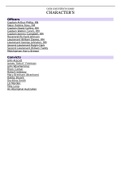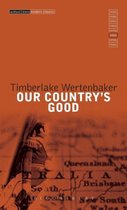OUR COUNTRY’S GOOD
CHARACTER’S
Officers
Captain Arthur Phillip, RN
Major Robbie Ross, RM
Captain David Collins, RM
Captain Watkin Tench, RM
Captain Jemmy Campbell, RM
Reverend Richard Johnson
Lieutenant William Dawes, RM
Lieutenant George Johnston, RM
Second Lieutenant Ralph Clark
Second Lieutenant William Faddy
Midshipman Harry Brewer
Convicts
John Arscott
James "Ketch" Freeman
John Wisehammer
Black Caesar
Robert Sideway
Mary Brenham (Branham)
Dabby Bryant
Duckling Smith
Liz Morden
Meg Long
An Aboriginal Australian
,OFFICERS;
Captain Arthur Phillip, RN
GENERAL PERSONALITY;
- Calm and Controlled Leader
- Contrasts to Major Robbie Ross’ Leadership
- He shows an obvious patience and understanding towards the convicts, especially Liz Morden.
- Throughout the play he refers to historical people and situations, such as famous thespians Garrick and
Kemble. He is intellectual, understanding, and authoritative.
- Humane and Liberal ruler: he wanted to live peacefully with the native Aboriginal peoples and insisted the
convicts and officers had the same rations.
- Phillips intuitive humanity allied to his belief in the potential for improvement in any human being.
- He is a representation of a liberal belied system that favours education and redemption over punishment.
- Phillips humanist tendencies are repeatedly asserted.
CONTEXT;
- The real Arthur Phillip had been called out of retirement to take on the position of Governor of the first fleet to
Australia, he was very well respected.
CHARACTER ARC/ AIMS OF THE CHARACTER;
- Show alternative to hanging, show how people had started to move on from tradition forms of punishment.
THEMES;
- Nature vs. nurture, Redemption rather than executions
WERTENBAKER’S INTENTIONS;
- To show that some officers did want to see the way crime was delt with changed
- Showed some officers had good morals and wanted to do good
COSTUME;
- Captains Uniform, neatly washed, smart and pressed
- Polished shoes
- Blue navy coat shows diversity of the officers- white lapels and gold stitching
- Large and historically accurate badges show hierarchy in the colony
- Ivory coloured knee breeches with cotton socks (high quality material)
- Black leather shoes with a gold baroque-style buckles
- Small amount of dirt upon his shoes
- Pocket watch/ compass show his afflictions with the navy
- Tricorn with red and gold buttons
VOCAL & PHYSICAL SKILLS;
- Voice; Strong assertive voice, speaking slow and confidently, in control.
- Posture; Straight posture, shoulders back and head help up high. Hands behind his back with chest out= pride
and confidence. Consistent eye contact with people he was talking to.
MAIN SCENES;
ACT ONE SCENE THREE: He voices his objections to hanging and is instinctively repulsed by the idea of hanging a
seventeen-year-old boy and an eighty-two-year old woman. This is contrasted with the harsher, more cynical views of
the other officers. He suggests it is possible to reform convicts through education and culture. When the other officers
mock him, he retorts: ‘We learned to love such things because they were offered to us when we were children or young
men. Surely no one is born naturally cultured?” As a Governor general he has the power of an absolute monarch over
the Australian territories. It is interesting that he someone’s chooses not to use these powers, and instead opens
himself to a process of debate and democratic decision. This is demonstrated in Act One Scene 6:
ACT ONE SCENE SIX: In which the officers debate whether to put on the play. Phillip could simply order the play to
go ahead, but instead he allows the officers to vote on it.
ACT TWO, SCENE TEN: Phillips powers would allow him to overrule the court and give Liz a pardon, instead,
however, her defers to the process of justice and feels it necessary both to hear Liz’ evidence and have it corroborated.
ACT TWO, SCENE TWO: He declares’ “What is a Statesman’s responsibility?--- Terror and hatred on theirs.”
Timberlake is presenting Phillip here a s a progressive and learned man. Demonstrates his knowledge of ‘Social
Contract Theory’= organise society into a more egalitarian manner. Phillip hopes that by mounting a production of
, The Recruiting officer, the convicts can prove this argument to be true. He is particularity interested in Liz Morden
being involved, as she is notoriously ‘the most difficult woman in the colony. Her redemption through art will be an
example to all.
Major Robbie Ross, RM;
GENERAL PERSONALITY & BELIEFS;
- Bitterness (Look at context) Vile, power obsessed man, who intimidates the convicts and believes that the
convicts' punishment should be severe.
- He is completely against the play 'The Recruiting Officer' being put on, and constantly ridicules Ralph Clark
for it. Ross is vehemently opposed to the idea of putting on a play.
CONTEXT;
- The real Major Robbie Ross had previously been on the losing side of the American War of Independence.
Reference to this; 'This is a profligate prison for us all, it's a hellish hole we soldier have been hauled to
because they blame us for losing the war in America.' (Act Two, Scene Ten). The fact he feels he is being
blamed may account for some of his bitterness.
- He was in conflict with the governor Arthur Phillip and other officers, he was thoroughly disliked. He made
the governor's job of administering new colony more difficult.
CHARACTER ARC/ AIMS OF THE CHARACTER;
- To show the effective bad and backwards opinion on rehabilitation versus retribution
- His character doesn't change; he doesn't improve and develop as a person, he remains in his views of the
convicts; that they are lesser people, entirely beneath him and so do not deserve the same rights and respect as
others, he treats them as not really human.
THEMES HE ELICTS;
- He is on retribution side of rehabilitation vs. retribution. He is also on nature side of nature vs. nurture. He
doesn't believe in theatre transcending reality and its healing powers.
WERTENBAKER’S INTENTIONS;
- He represents the harsh and deconstructive view of the convicts and of humanity
- Educate people on the power of change in a person and how all should be treated with respect and when you
help people they grow - he provides a stark contrast to this.
COSTUME;
- Uniform throughout in perfect condition, never taking it off, to show his authority and rank but also his high
opinion of himself and his sense superiority.
- Other Officers uniform would get more relaxed as the play goes on due to the increasing union between the
officers and convicts. Ross however represents the separation between them.
- Black tricorne hat with gold piping embroidery
- Made from expensive beaver and shiny gold buttons
- Reg Georgian military jacket faded with dusty rocks
- Very tight and muscular is intimidating and use of gold trim of the lapels
- Ivory breeches with gold buttons (polished0
- Black leather boots which have been polished
- Brutality shown on bloody sleeve
VOCAL AND PHYSICAL SKILLS;
- Loud, carrying voice. Dignified tone giving an aura or self-importance.
- Unpleasant rude tone
MAIN SCENES;
- Act two scene ten - the question of Liz Morden
- Act one scene six -the authorities discuss the merits of theatre, introduced to Ross and his
views/opinions/personality and overall role among the other characters and how he fits.
- Act two scene five - the second rehearsal, really see his aggressive and unpleasant nature and the way he treats
the convicts.
ACT ONE SCENE SIX: he argues that ‘the prisoners are ger to be punished and were here to make sure they get
punished’. This is a philosophy he pursues throughout, ritually humiliating the convicts in the two rehearsal scenes
and insisting that Liz Morden should be hanged in Act Two, Scene ten.
The convicts fear Ross’s sadistic violence, which he demonstrates in Act Two Scene five. In return, he views the
convicts as subhuman: “I have seen the white of this animals’ bones---- he’s feeling modest?”
By today’s standards Ross behaves appallingly and holds unattractive right-0wong views concerning the rehabilitation
of prisoners, but it would be a mistake to play him as an absurd tyrant.





